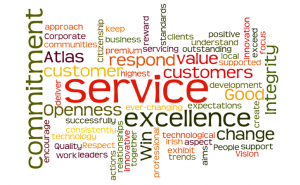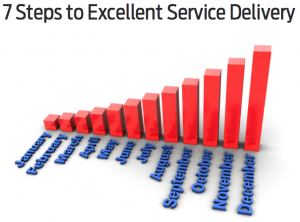I too often hear the phrase service excellence used these days when describing technology delivery services, and in most cases there’s no definition of what this actually means.
Let’s go back to basics then and look at we mean by excellence in this context. From the Oxford dictionary, we have “The quality of being outstanding or extremely good”. Another definition is as a quality that people really appreciate, because it’s hard to find, and as being the quality of excelling, of being truly the best at something.
I like this last one – being the best at something and excelling – so going above and beyond the normal expectations, and importantly setting new standards.
It’s this excelling at something that hits the mark for many customers when it comes to service. Many of the organisations I’ve worked with and for, have been in challenging situations around their customer service, customer experience etc, and one of the focuses for my role there has been to revitalise their approach and work to transform the way they engage with customers, be they internal or external customers.
In this day and age, we’re all consumers (outside of the normal workplace) of goods and services and our expectations have changed significantly over the last few years. It’s now all about a truly anyhow, anywhere and anytime culture, and this has a huge impact on how organisations need to work and change and adapt.
To add to this challenge, some of the more legacy technology services that we’re delivering – as well as the new innovative solutions an services – just have to work. Email is a great example. If your email service is 100% available, 24×7, and can be accessed wherever you are on any device, is this an excellent service or is it just expected?
I read an interesting article a few weeks back, on cio.com, titled “7 Steps to Excellent Service Delivery“, by Phil Weinzimer – do take a look, there are some really good ideas here.
Phil sets out a 7 step plan that CIOs can use, to improve the delivery of their services to the business, and the core theme is understanding the business objectives better and delivering to meet those.
In summary the 7 steps that Phil’s lists are:
- Identify the business and commodity services required by the business units
- Identify the key stakeholders and priority for each business service
- Build and develop the enterprise list of business services, for each unit
- Socialise and communicate across the enterprise
- Develop and execute the work plan, and get stakeholder buy-in
- Continuously measure the service delivery – and build and use business focused SLAs
- Continuously improve – regularly evaluate the service with the stakeholders and users
I really like this approach. It’s critical as I’ve mentioned to engage more with the business and key stakeholders, and to be able to respond in a very agile manner to their needs!
How does your service measure up? And what does excellent service mean to you?










